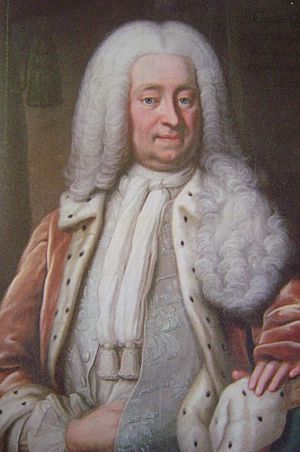Carl Gyllenborg facts for kids
Quick facts for kids
Carl Gyllenborg
|
|
|---|---|
 |
|
| Personal details | |
| Born | 7 March 1679 Stockholm, Sweden |
| Died | 9 December 1746 (aged 67) Uppsala, Sweden |
Count Carl Gyllenborg (born March 7, 1679 – died December 9, 1746) was an important Swedish politician and writer. He held many high positions in the Swedish government during his life.
Contents
Early Life and Career
Carl Gyllenborg was born in Stockholm, Sweden. His father was Count Jacob Gyllenborg. Jacob was also a well-known politician. He served as a Member of Parliament and part of the Royal Council. He was also the Governor of Uppland from 1689 to 1695.
Carl Gyllenborg started his career in the military. He served in the Polish War. After his military service, he became a diplomat. He was sent to London as a secretary for the Swedish government.
Diplomatic Missions
While in London, Carl Gyllenborg married Sara Wright. In 1715, he became a minister plenipotentiary. This meant he was a high-ranking diplomat.
In 1717, he was held for five months. This was because he was part of a plan. The plan aimed to help the House of Stuart return to power in Britain. His letters about this plan were later published. They were printed in both French and English.
Political Leadership
Carl Gyllenborg returned to Sweden and continued his political career. In 1723, he was named a Councilor of State. This was a very important role in the government.
In 1738, he became the Chancery President. This position was like being both the Prime Minister and the Foreign Minister of Sweden. It was one of the most powerful jobs in the country.
The Hat Party
While serving as Chancery President, Carl Gyllenborg helped create a political group. This group was called the Hattparti, or the ‘Hat’ Party. This party played a big role in Swedish politics.
The Hat Party started a war with Russia. This was the Russo-Swedish War (1741–1743). The war did not go well for Sweden. It led to Sweden losing an area called Kymmenegård.
Contributions to Education and Arts
Carl Gyllenborg was also very interested in education and the arts. He served as the chancellor for two major universities. He was chancellor of Lund starting in 1728. Later, in 1739, he became chancellor of Uppsala.
He was a supporter of writers and artists. He wrote several poems himself. He also wrote the first Swedish comedy play. It was called Den svenska Sprätthöken, published in 1740.
In 1711, Carl Gyllenborg was chosen as a Fellow of the Royal Society of London. This is a very old and respected group for scientists and thinkers.
Other sources
 | George Robert Carruthers |
 | Patricia Bath |
 | Jan Ernst Matzeliger |
 | Alexander Miles |

